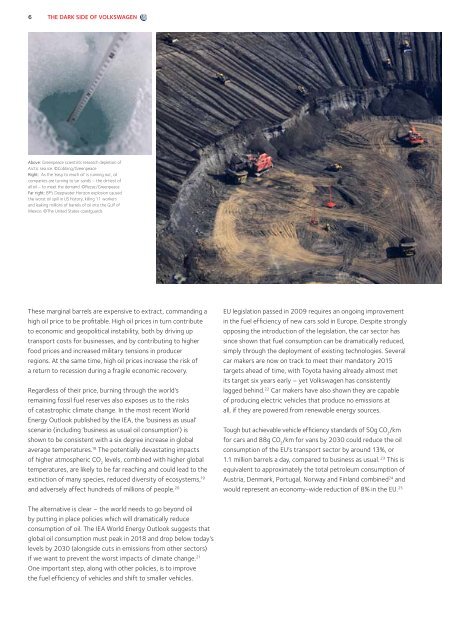The Dark Side of Volkswagen - Greenpeace
The Dark Side of Volkswagen - Greenpeace
The Dark Side of Volkswagen - Greenpeace
Create successful ePaper yourself
Turn your PDF publications into a flip-book with our unique Google optimized e-Paper software.
6 THE DARK SIDE OF VOLKSWAGEN<br />
Above: <strong>Greenpeace</strong> scientists research depletion <strong>of</strong><br />
Arctic sea ice. ©Cobbing/<strong>Greenpeace</strong><br />
Right: As the ‘easy to reach oil’ is running out, oil<br />
companies are turning to tar sands – the dirtiest <strong>of</strong><br />
all oil – to meet the demand. ©Rezac/<strong>Greenpeace</strong><br />
Far right: BP’s Deepwater Horizon explosion caused<br />
the worst oil spill in US history, killing 11 workers<br />
and leaking millions <strong>of</strong> barrels <strong>of</strong> oil into the Gulf <strong>of</strong><br />
Mexico. ©<strong>The</strong> United States coastguards<br />
<strong>The</strong>se marginal barrels are expensive to extract, commanding a<br />
high oil price to be pr<strong>of</strong>itable. High oil prices in turn contribute<br />
to economic and geopolitical instability, both by driving up<br />
transport costs for businesses, and by contributing to higher<br />
food prices and increased military tensions in producer<br />
regions. At the same time, high oil prices increase the risk <strong>of</strong><br />
a return to recession during a fragile economic recovery.<br />
Regardless <strong>of</strong> their price, burning through the world’s<br />
remaining fossil fuel reserves also exposes us to the risks<br />
<strong>of</strong> catastrophic climate change. In the most recent World<br />
Energy Outlook published by the IEA, the ‘business as usual’<br />
scenario (including ‘business as usual oil consumption’) is<br />
shown to be consistent with a six degree increase in global<br />
average temperatures. 18 <strong>The</strong> potentially devastating impacts<br />
<strong>of</strong> higher atmospheric CO 2 levels, combined with higher global<br />
temperatures, are likely to be far reaching and could lead to the<br />
extinction <strong>of</strong> many species, reduced diversity <strong>of</strong> ecosystems, 19<br />
and adversely affect hundreds <strong>of</strong> millions <strong>of</strong> people. 20<br />
<strong>The</strong> alternative is clear – the world needs to go beyond oil<br />
by putting in place policies which will dramatically reduce<br />
consumption <strong>of</strong> oil. <strong>The</strong> IEA World Energy Outlook suggests that<br />
global oil consumption must peak in 2018 and drop below today’s<br />
levels by 2030 (alongside cuts in emissions from other sectors)<br />
if we want to prevent the worst impacts <strong>of</strong> climate change. 21<br />
One important step, along with other policies, is to improve<br />
the fuel efficiency <strong>of</strong> vehicles and shift to smaller vehicles.<br />
EU legislation passed in 2009 requires an ongoing improvement<br />
in the fuel efficiency <strong>of</strong> new cars sold in Europe. Despite strongly<br />
opposing the introduction <strong>of</strong> the legislation, the car sector has<br />
since shown that fuel consumption can be dramatically reduced,<br />
simply through the deployment <strong>of</strong> existing technologies. Several<br />
car makers are now on track to meet their mandatory 2015<br />
targets ahead <strong>of</strong> time, with Toyota having already almost met<br />
its target six years early – yet <strong>Volkswagen</strong> has consistently<br />
lagged behind. 22 Car makers have also shown they are capable<br />
<strong>of</strong> producing electric vehicles that produce no emissions at<br />
all, if they are powered from renewable energy sources.<br />
Tough but achievable vehicle efficiency standards <strong>of</strong> 50g CO 2 /km<br />
for cars and 88g CO 2 /km for vans by 2030 could reduce the oil<br />
consumption <strong>of</strong> the EU’s transport sector by around 13%, or<br />
1.1 million barrels a day, compared to business as usual. 23 This is<br />
equivalent to approximately the total petroleum consumption <strong>of</strong><br />
Austria, Denmark, Portugal, Norway and Finland combined 24 and<br />
would represent an economy-wide reduction <strong>of</strong> 8% in the EU. 25

















